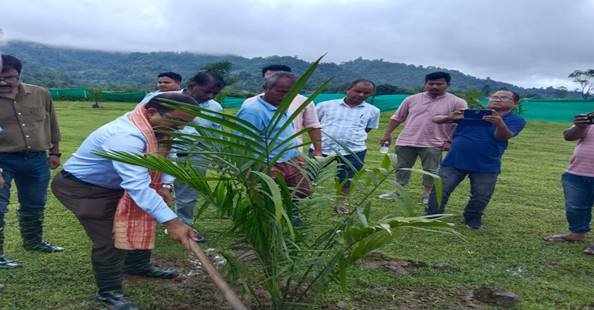ICAR-IIHR Bengaluru inaugurates HAL-ICAR-IIHR Seed Production Centre
The new facilities include Spawn Incubation and Capacity Development Center (Rs 114 lakhs), a Plant Health Clinic (Rs 108 lakhs) equipped to diagnose plant pests and diseases, an Agri-Business Incubation (ABI) Centre (Rs. 12 lakhs) and a Centre of Excellence on Kamalam Fruit (Rs 536.72 lakhs).
The ICAR-Indian Institute of Horticultural Research (ICAR-IIHR), Bengaluru, witnessed the inauguration of several new buildings and facilities. The event was graced by the presence of Dr Himanshu Pathak, Secretary, DARE and DG, ICAR, marking a significant step forward for the horticultural sector in India.
Several key facilities were inaugurated at ICAR-IIHR, including a Post-Graduation Dining Facility (Rs. 42.83 lakhs), a Spawn Incubation and Capacity Development Center (Rs. 114 lakhs), a Plant Health Clinic (Rs. 108 lakhs) equipped to diagnose plant pests and diseases, an Agri-Business Incubation (ABI) Centre (Rs. 12 lakhs) and a Centre of Excellence on Kamalam Fruit (Rs. 536.72 lakhs), and the IIHR Fruit Plant Mall (Nursery). These facilities mark significant strides in advancing horticulture research and practice at ICAR-IIHR.
The inauguration also included the HAL-ICAR-IIHR Seed Production Centre, supported by Hindustan Aeronautics Limited (HAL) with an investment of Rs. 2.53 crores under corporate social responsibility, as well as the Karnataka Exotic Fruit Farmers Association (KEFA).
During the inauguration, Dr. Sanjay Kumar Singh, the Director of ICAR-IIHR, welcomed the guests and provided a comprehensive account of the institute’s activities and accomplishments. Dr V. B. Patel, ADG – Fruits & Plantation Crops, conveyed his best wishes to ICAR-IIHR, which is set to celebrate its foundation day on 5th September 2023. He wished the institute many more laurels in the future.
During the occasion, Zopui Consultancy in Mizoram and Wealth Capital Services in Hyderabad signed MoUs for the technology transfer of Ready to Serve (RTS) Beverages from Kamalam.
Dr Himanshu Pathak, during his address, highlighted the significance of these facilities. In recognition of his contributions, Dr Himanshu Pathak was felicitated by ICAR-IIHR and by the farmers, reaffirming his pivotal role in advancing horticulture in India. Dr Pathak expressed his gratitude and optimism for the future, emphasising the vital role of research and innovation in agriculture.
The new facilities include Spawn Incubation and






